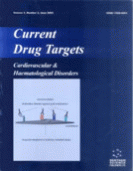Abstract
It is now widely accepted that atherosclerosis is a complex chronic inflammatory disorder of the arterial tree associated with several risk factors. From the initial phases of leukocyte recruitment to eventual rupture of vulnerable atherosclerotic plaques, a low-grade inflammation, also termed microinflammation, appears to play a key pathogenetic role. Experimental and clinical evidence suggests that cyclooxygenase-2 (COX-2), an enzyme which catalyzes the generation of prostaglandins from arachidonic acid, also contributes to lesion formation. COX-2 has been detected in macrophages, smooth muscle cells and endothelial cells in human atherosclerotic lesions. Several studies have also reported the presence of COX-2 in the shoulder region of atherosclerotic plaques, mainly colocalizing with macrophages and MMPs, enzymes that are involved in the destabilization of atherosclerotic plaques, leading to rupture and atherothrombotic syndromes (i.e. acute myocardial infarction). We have recently assessed monocyte COX-2 activity and the production of PGE2 in a population of apparently healthy subjects free from clinically overt atherosclerosis. We found an association between increased PGE2 and increasing number of cardiovascular risk factors and carotid intima-media thickness, a noninvasive surrogate marker of atherosclerosis, independently of traditional and non traditional cardiovascular risk factors. Our findings support the notion that the COX-2/PGE2 axis may have a role in atherosclerosis, and this might be an attractive therapeutic target. COX-2 inhibitors, collectively called coxibs (celecoxib, rofecoxib, valdecoxib, lumiracoxib, etc), held a promise of improved treatment of arthritis without the gastrointestinal side effects associated with aspirin and other nonsteroidal antiinflammatory drugs. However, clinical studies raise several clinically relevant questions as to their beneficial role in atherosclerosis prevention, because of increased thrombogenicity and cardiovascular risk. Only well designed large scale clinical trials can provide the answer as to the net effect of selective COX-2 inhibition on cardiovascular events before this new class of anti-inflammatory drugs can be incorporated into the armamentarium of atherosclerosis.
Keywords: cyclooxygenase, atherothrombosis, prostaglandin e, inflammation, coxibs, mpges, cardiovascular risk
 3
3











